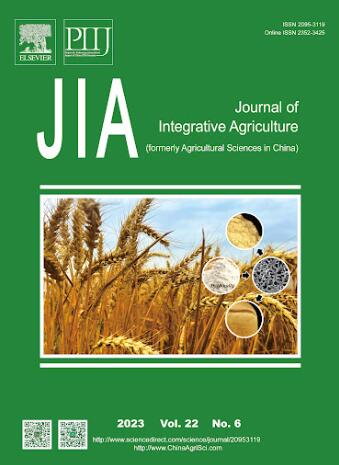生物炭诱导的生态系统服务与作物生产力之间的权衡与协同作用
IF 4.4
1区 农林科学
Q1 AGRICULTURE, MULTIDISCIPLINARY
引用次数: 0
摘要
生物炭改良剂为可持续农业提供了机会。然而,生物炭的有效性取决于其物理和化学特性,而这些特性在很大程度上受到生物炭生产条件和管理方法的影响。因此,生物炭在全球农业系统中的使用还存在很大的不确定性。本研究首次对生物炭特性和管理方法对关键生态系统服务的影响进行了定量评估,通过对生物炭添加和未添加系统中的 34628 个配对观测数据进行二阶荟萃分析,对生物炭特性和管理方法对关键生态系统服务的影响进行了定量评估。总体而言,生物炭可增强植物毒性缓解、生理调节、土壤修复和碳固存以及微生物功能基因丰度。然而,在作物产量和生态系统服务交付(包括养分循环、微生物功能、气候变化减缓和土壤微生物群落)之间存在一些突出的权衡问题。采用以污水污泥为原料、在高温热解条件下生产的低碳氮比生物炭,结合适度的施用率和无机肥料投入,显示出实现作物生产力和生态系统服务协同促进的潜力。这些成果凸显了针对特定地点的土壤制约因素明智实施基于生物炭的解决方案的必要性。量化的协同作用和权衡关系将有助于建立一个可持续的生物炭发展框架,加强必要的生态系统服务,确保粮食安全。本文章由计算机程序翻译,如有差异,请以英文原文为准。
Biochar induced trade-offs and synergies between ecosystem services and crop productivity
Biochar amendment offers a chance for sustainable agriculture. However, the effectiveness of biochar relies on its physical and chemical properties, which are heavily affected by biochar production conditions and management practices. Therefore, substantial uncertainties regarding the use of biochar exist in agricultural systems globally. This study provides the first quantitative evaluation of the impacts of biochar characteristics and management practices on key ecosystem services by performing a second-order meta-analysis based on 34,628 paired observations in biochar-amended and unamended systems. Overall, biochar enhances phytotoxicity alleviation, physiology regulation, soil remediation and carbon sequestration, and microbial functional gene abundance. However, some prominent trade-offs exist between crop productivity and ecosystem service deliveries including for nutrient cycling, microbial function, climate change mitigation, and the soil microbial community). The adoption of low C:N biochar produced at high pyrolysis temperatures from sewage sludge-derived feedstock, in combination with a moderate application rate and inorganic fertilizer input, shows potential for achieving synergistic promotion of crop productivity and ecosystem services. These outcomes highlight the need for judicious implementation of biochar-based solutions to site-specific soil constraints. The quantified synergy and tradeoff relationships will aid the establishment of a sustainable biochar development framework that strengthens necessary ecosystem services commensurate with food security assurance.
求助全文
通过发布文献求助,成功后即可免费获取论文全文。
去求助
来源期刊

Journal of Integrative Agriculture
AGRICULTURE, MULTIDISCIPLINARY-
CiteScore
7.90
自引率
4.20%
发文量
4817
审稿时长
3-6 weeks
期刊介绍:
Journal of Integrative Agriculture publishes manuscripts in the categories of Commentary, Review, Research Article, Letter and Short Communication, focusing on the core subjects: Crop Genetics & Breeding, Germplasm Resources, Physiology, Biochemistry, Cultivation, Tillage, Plant Protection, Animal Science, Veterinary Science, Soil and Fertilization, Irrigation, Plant Nutrition, Agro-Environment & Ecology, Bio-material and Bio-energy, Food Science, Agricultural Economics and Management, Agricultural Information Science.
 求助内容:
求助内容: 应助结果提醒方式:
应助结果提醒方式:


